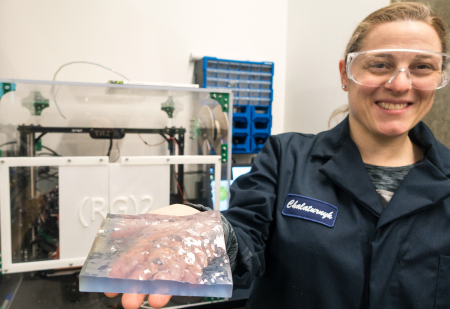
Hope Walls, a research administrator with the U of A's Geomechanical Reservoir Experimental Facility, holds a rock model created using a 3-D printer. Similar technology will be used to create 3-D models to help understand how oil and gas move through rock formations and fissures.
It also signalled Mexico was keen for international partnerships to transform a sector in dire need of skilled talent, new technologies and improved sustainability.
"This is a real opportunity for us to take expertise in Mexico and expertise at the University of Alberta and really apply them to specific technical challenges that Mexico has in their whole energy reform," said Rick Chalaturnyk, a professor of geotechnical engineering at the U of A.
A delegation from the university, led by President David Turpin, was in Mexico last week to announce a $14-million research collaboration that aims to do exactly that.
Chalaturnyk is co-lead of a five-year, $4.4-million research collaboration with the Mexican Petroleum Institute to improve our understanding of how oil and gas flows in naturally fractured reservoirs, which represent the majority in Mexico, he said.
As reservoirs are depleted, either through regular production or enhanced oil recovery processes, the reservoirs and naturally occurring rock fractures deform-changing the behaviour of the flow of oil and gas. That makes it difficult to maximize production, he said.
3-D printed rocks to understand oil and gas flow
Chalaturnyk's lab is among a handful in the world that uses 3-D printing technology to recreate reservoir fractures and rock formations. Instead of relying solely on numerical models, they use laser mapping to print 3-D models of fractures that his team can flow real fluids through to observe their behaviour.
"That's the kind of innovation that really caught Mexico's interest," he said. "We're really excited about applying new technologies to allow us to explore these issues in a kind of state-of-the-art, game-changing way."
Optimizing production is not only good for Mexico's revenue streams and quality of life, which are heavily tied to hydrocarbon production, but has environmental benefits as well, Chalaturnyk said.
"From an environmental standpoint, anything you can do on the efficiency side, if you're using less energy to produce a barrel of oil, you win on both sides."
There are already 94 students with Mexican citizenship studying at the U of A-up from 77 last year-and those numbers could grow with the partnership. Chalaturnyk said his lab will expand by several graduate students and post-docs, and there will be Mexican researchers working at the U of A and vice versa.
Talent exchange benefits both countries
Turpin said such talent exchanges benefit both countries in terms of the research and developing a global worldview.
"An international partnership on this scale is invaluable on so many levels. Research cannot happen in isolation; it isn't constrained by geographic boundaries," he said. "At the same time, building global citizenship is an important part of a university education with benefits here at the U of A and in Mexico."
Strengthening the capacity and talent of Mexico's hydrocarbon sector is the goal of a separate $5-million project with the National Autonomous University of Mexico and Panamericana University. Mexico estimates it needs an additional 135,000 skilled specialists trained to oversee new technologies, projects and policies key to energy reform.
"We have set in motion research and training programs between Mexico's National Autonomous University, the Mexican Petroleum Institute and the University of Alberta, to ensure that there is technical capacity in Mexico to face the challenges that the energy sector will face in years to come," said Pedro Joaquin Coldwell, Mexico's secretary of energy, which is funding the research.
Britta Baron, vice-provost and associate vice-president international, and the U of A's lead for the project, said the partnership is the university's first major research collaboration with a government outside Canada.
"The fact that Mexico has turned to Alberta and the U of A speaks volumes about the quality of our expertise and talent in energy and hydrocarbon research," she said.
The U of A first signed a memorandum of understanding with Mexico's ministry of energy in December 2015. The three projects awarded funding were part of a competitive bid process and announced March 9 in Mexico City.